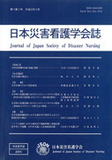Japanese
English
- 有料閲覧
- Abstract 文献概要
- 参考文献 Reference
- サイト内被引用 Cited by
はじめに
日本災害看護学会第12回年次大会を2010年8月28日29日に福井で開催した。本大会の大会長講演では、「災害看護を物語る」と題して福井豪雨災害の体験から実感した災害看護研究の必要性、時間論との出会い、時間論と災害看護について講演した。講演では、まず、被災者が災害直後に撮影した福井豪雨のビデオ映像を流した。そして、福井豪雨で自分自身が体験したことと過去の災害時の被災者の事例から、災害看護と時間論との関連を探っていったプロセスを物語った。
時間には、大きく分けて時計が示すような物理学的な時間、つまり、「存在の時間」と時間はこころの内にあるとする「意識の時間」の2つがある。災害の被害に遭うと、自分の時間の感覚が急激に変化し、心身に影響を及ぼすため、被災者一人ひとりの物語における時間の変化を理解した上で災害時の看護を実践することが大切である。つまり、今後の災害看護学の発展には、被災地および被災者の個別の物語を重視した教育・研究が重要となる。
In the beginning...
The 12th convention of Japan Society of Disaster Nursing was held on the 28th and 29th of August in 2010 in Fukui. The chairman of this convention gave a lecture about the theory of time, the relationship between the theory of time and disaster nursing. The chairman also discussed the significance of studying disaster nursing throughout the experience of the deluge in Fukui, and was the title of the lecture "telling a story of disaster nursing". It gave an account of the process of exploring the association of the theory of time through the personal experience of the deluge and the experience of victims in the disaster.
Time can be divided into two definitions. One is'time of existing'which signifies physical time such as a clock, and the other is'time of conscience'which refers to the idea of time in one's mind. Once people have faced disaster, the sense of time suddenly changes and affects one's mind and body, thus it is necessary for disaster nursing to understand the transition of time for each victim. Furthermore, instruction and study which takes the experience of each victim and the stricken area seriously are significant for the future development of disaster nursing.
Copyright © 2010, Japan Society of Disaster Nursing All rights reserved.


